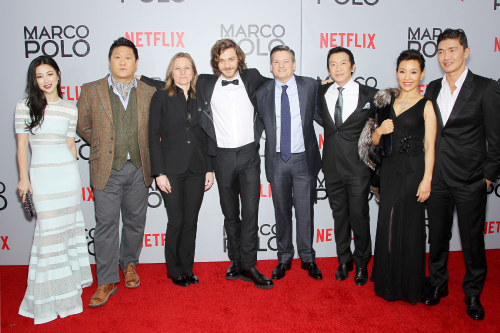|
 |
|
ALL-STAR TEAM: Italian actor Lorenzo Richelmy (fourth left), who plays the role of Marco Polo, British actor Benedict Wong (second left), who stars as Kublai Khan, and Netflix's Chief Content Officer Ted Sarandos (fourth right) at the Marco Polo series' premiere in New York City on December 2, 2014 (IC) |
"Kublai is someone so high up in power that he's constantly surrounded by people saying 'yes' and never gets an honest answer. When he meets Marco, something jolts in him and he thinks, 'Wow, you're telling me the truth'," Wong said. "Marco can describe Kublai's kingdom to him. It's almost like he's the Internet of the middle ages and slowly, bit by bit, he becomes a therapist to him or an alternative son."
Historical costume dramas are not common in American television, but the highly popular HBO series Game of Thrones is the prototype for these medieval sword fantasy-type tales. Long, wide shots show grand views of soldiers riding into battle across sweepingly barren landscapes, and the costumes are luxe and expensive. The New York Times calls it "fur and armor" series.
Sadly, Marco Polo moves at a glacial pace. Nearly an hour goes by before any martial arts sequences happen, and the dialogue is heavy and slow. Richelmy, in the title role, is wooden and boring--likely because he speaks little English. As it progresses, however, Marco Polo picks up steam. Each episode ends on a cliffhanger--making it a perfect addition to "Netflix streaming syndrome" characterized by binge watching.
The first season of Marco Polo will tell only the beginning of his 17 years of travels--his three-year journey from Venice to Beijing and his first year in court.
Polo is a popular figure in China, and the story has been staged for TV and film screens many times in both China and the United States. The Venetian merchant has a compelling 24-year journey across Asia and was one of the first Europeans to chronicle the cities and cultures of the Far East. His accounts of unfamiliar animals such as elephants and monkeys are described as mythical monsters. For example, he mistook a rhinoceros for a unicorn.
Kublai died shortly after Polo returned to Venice, sending his empire into decline and cutting off the Silk Road. As few travelers dared to repeat his journey, the legend of Polo grew, and still enraptures audiences today.
Netflix targets Asia
Taking on the well-known tale of Polo may be a strategic move for Netflix as it targets new markets overseas. Netflix currently has 50 million subscribers in 40 countries. The service has not yet launched in Asia, and viewers there can watch Marco Polo solely through pay TV and Internet platforms. Developers are hoping a successful East-West story like the Silk Road adventurer can pave the way for an Asian expansion.
"Before we even launch in a territory, these shows can be a calling card," Ted Sarandos, Netflix's Chief Content Officer, told the Los Angeles Times. "A good example has been House of Cards, which is on Canal+ in France, but people recognize it as a Netflix show before Netflix shows up in France."
House of Cards already enjoys a thriving audience in Beijing, airing on Sohu.com's digital video service. Sohu said more than 24 million viewers in China watched Season One of the drama. Though the show is about American politics, Sarandos said it has universal appeal.
"Most people say that's a pretty American show set against American politics," Sarandos said at the recent U.S.-China Film Summit in Los Angeles. "But at its core, if you dig deeper it's a very human show. It's much more rooted in Shakespeare than it is Washington politics."
The company plans to follow a similar approach in China as in other countries.
"I've always believed it's not about being more Chinese or any less American; it's about thinking more globally," Sarandos said. "I don't have a team thinking, 'How are we going to get into China?' We're going to get there by having great content that everyone wants to see."
With Marco Polo, Netflix believes it has winning content that will pull in new viewers and help expand the company's global presence. It is like the story of Polo himself, Sarandos told The New York Times.
"At some point or another we have all been a stranger in a strange land," he said. "Netflix is that stranger in a strange land."
The author is a contributing writer to Beijing Review, living in New York City
Email us at: yanwei@bjreview.com | 